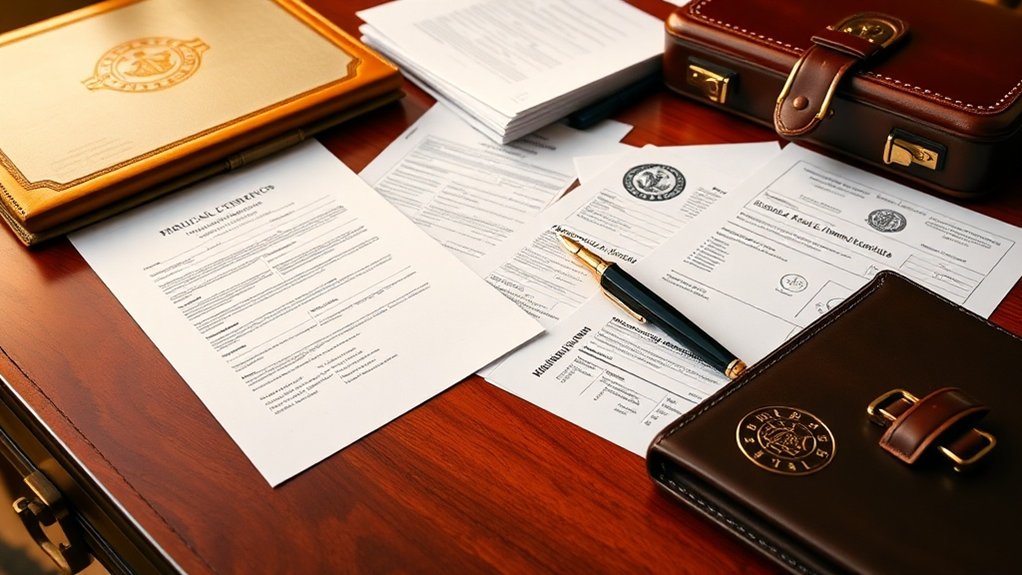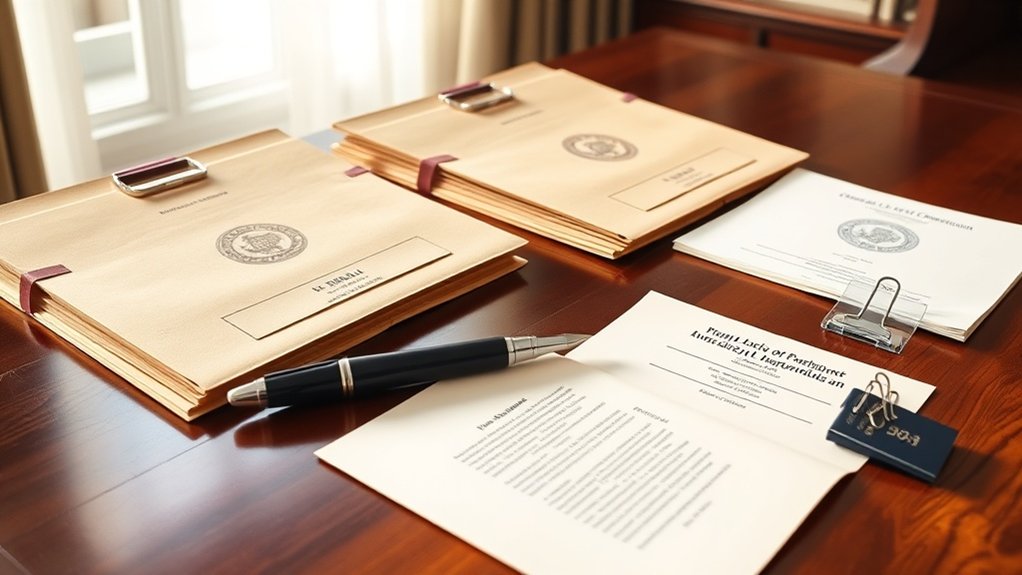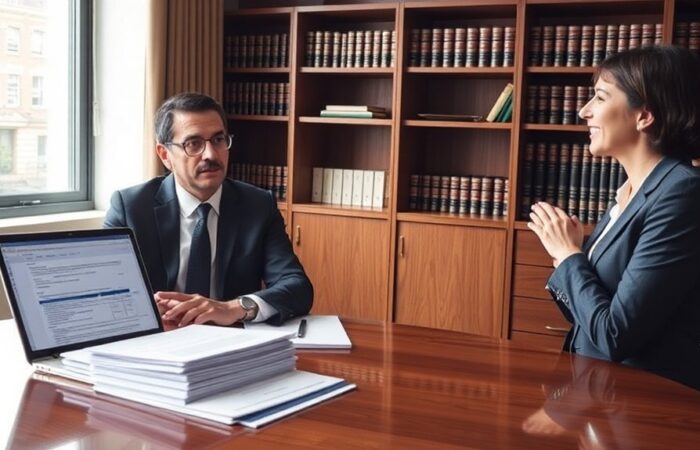You’re facing a complex immigration status change while already in Brazil, and you know the process can make or break your future plans. The Brazilian immigration system’s intricate requirements and shifting regulations create countless opportunities for costly mistakes that could delay your petition for months or even result in denial. What you might not realize is how the right legal strategy can transform this bureaucratic maze into a streamlined path toward your new status.
Understanding Brazil’s Immigration Status-Change Framework

When you’re already residing in Brazil on a temporary visa, you don’t need to leave the country to obtain a different immigration status. Brazil’s legal framework allows in-country status changes through petitions submitted directly to the Federal Police, eliminating costly international travel and visa processing delays.
You can transition between various temporary categories, including work visas, student visas, investor visas, and family reunification permits. The process involves submitting specific documentation that proves your eligibility for the new status category while maintaining your current legal presence.
Brazil’s immigration law recognizes that circumstances change, and you shouldn’t face bureaucratic penalties for adapting your legal status accordingly. Whether you’re switching from student to work authorization or upgrading to permanent residency, the status-change procedure streamlines your transition.
Understanding these mechanisms ensures you’ll navigate Brazil’s immigration system efficiently while avoiding common pitfalls that could jeopardize your legal standing. However, incorrect form filling and incomplete documentation can lead to delays, rejections, or even legal sanctions that compromise your immigration objectives.
Common Types of Status Modifications Within Brazilian Territory
Although Brazil offers numerous status-change pathways, several transitions occur more frequently than others among foreign residents. You’ll most commonly encounter requests to change from tourist status to temporary residence, particularly for family reunification purposes when you’ve married a Brazilian citizen or have Brazilian children.
Student visa conversions represent another frequent modification. If you’re completing your studies, you can transition to a work visa or permanent residence based on employment opportunities. Conversely, many professionals switch from temporary work visas to permanent residence after meeting the required time and conditions.
Investment-based transitions are increasingly popular. You might convert from a business visitor status to an investor visa if you’re establishing commercial operations in Brazil. Family-based modifications also include dependent visa changes when your sponsoring relative obtains Brazilian citizenship or permanent residence.
Humanitarian status changes occur when you’re seeking refugee protection or have compelling circumstances requiring extended stay authorization beyond your original visa category. Given the complexity of these transitions and constantly changing immigration laws, obtaining specialized legal support ensures proper documentation and compliance throughout your status-change process.
Documentation Requirements and Legal Compliance Standards

You’ll need to gather specific document categories that align with your requested status change in Brazil. The compliance verification process requires you to submit authenticated paperwork that meets federal immigration standards. Your application’s success depends on providing complete documentation that satisfies both legal requirements and administrative protocols. Professional legal representation ensures compliance with immigration laws and reduces the risk of errors that could delay your status-change petition.
Required Document Categories
Since Brazil’s immigration system operates on strict documentation protocols, you’ll need to compile specific categories of documents that demonstrate your eligibility for status change. Personal identification documents form the foundation, including your passport, current visa, and birth certificate with apostille certification. Financial documentation proves your economic stability through bank statements, employment contracts, or investment records spanning the last six months. Educational credentials require authenticated diplomas and transcripts relevant to your intended status. Health documentation includes medical examinations and vaccination records from approved facilities. Criminal background checks from your home country and Brazil must be current and properly certified. Finally, you’ll submit relationship documents like marriage certificates or family ties proof when applicable for your specific petition type. Given the complexity of these requirements and frequent changes in regulations, professional legal assistance significantly reduces the risk of application denials due to documentation errors or missed deadlines.
Compliance Verification Process
Once you’ve gathered your documentation, Brazilian immigration authorities initiate a comprehensive compliance verification process that scrutinizes every aspect of your petition against established legal standards. This rigorous examination ensures your application meets all regulatory requirements before approval.
The verification process follows three critical stages:
- Document Authentication Review – Authorities verify the legitimacy of all submitted documents, checking for proper notarization, apostille certifications, and official translations that comply with Brazilian legal requirements.
- Eligibility Assessment – Immigration officers evaluate whether you meet the specific criteria for your requested status change, including financial requirements, background checks, and compliance with visa conditions.
- Administrative Processing – Officials conduct final cross-referencing with federal databases, ensuring no legal impediments exist that would disqualify your petition from approval.
Throughout this verification process, authorities apply standards established under the New Migration Law (Law No. 13.445/2017), which introduced significant changes to immigration procedures and compliance requirements.
Strategic Approach to Petition Preparation and Submission
While gathering your documents represents just the beginning, developing a comprehensive strategy for your status-change petition can significantly impact your success rate. You’ll need to analyze your current visa status and identify the most viable path forward, considering factors like processing times, eligibility requirements, and potential complications.
Timing your submission strategically matters. You should file your petition well before your current status expires, allowing sufficient processing time and avoiding overstay issues. Consider seasonal workloads at immigration offices and plan accordingly.
Your petition narrative must clearly demonstrate how you meet all legal requirements for the desired status. You’ll want to anticipate potential questions or concerns immigration officers might raise and address them proactively in your documentation.
Working with experienced legal counsel ensures you’re leveraging current precedents and regulations effectively. They’ll help you position your case optimally, reducing delays and increasing approval chances through proper preparation and strategic timing. Professional legal guidance becomes essential when navigating the complexity of Brazilian immigration laws and their rigorous documentation requirements.

You’ll face inevitable bureaucratic hurdles when submitting status-change petitions in Brazil, but understanding the system’s inner workings can significantly reduce delays. Streamlining your documentation process from the outset prevents costly revisions and resubmissions that extend processing times. You can expedite approval timelines by maintaining organized records, responding promptly to requests for additional information, and establishing clear communication channels with relevant authorities. Specialized immigration lawyers ensure compliance with legal requirements throughout the process and can significantly enhance the chances of successful immigration applications by providing expertise in filling out forms accurately and minimizing the risk of errors.
Streamlining Documentation Process
Because Brazil’s immigration system involves multiple agencies and complex paperwork requirements, you’ll need to develop a strategic approach to manage your status-change petition effectively.
You can significantly reduce processing delays by implementing systematic documentation practices that address common administrative bottlenecks:
- Create digital document portfolios with certified translations, apostilled certificates, and notarized copies organized by submission deadline and agency requirements.
- Establish verification protocols to cross-reference document formats against current Federal Police and Ministry of Justice specifications before submission.
- Maintain backup documentation systems including multiple certified copies and alternative format versions to address potential agency requests or corrections.
This proactive approach minimizes revision cycles and prevents costly resubmissions that can extend your petition timeline by several months. Working with specialized legal support throughout this documentation process increases your chances of application approval while helping you navigate the complex requirements more efficiently.
Expediting Approval Timelines
Even with perfectly organized documentation, Brazil’s status-change petitions face inherent bureaucratic delays that require proactive timeline management strategies. You’ll need to anticipate bottlenecks and implement acceleration tactics throughout the process.
| Strategy | Timeline Impact |
|---|---|
| Submit during off-peak periods | Reduces processing delays by 2-3 weeks |
| Follow up weekly with authorities | Prevents file stagnation and oversight |
| Prepare backup documentation | Eliminates resubmission delays |
| Use expedited processing options | Cuts standard timelines by 30-40% |
| Maintain direct communication channels | Enables real-time status updates |
You can’t control Brazil’s bureaucratic pace, but you can optimize your approach. Track submission dates, maintain detailed correspondence records, and establish regular check-in schedules with processing offices. Consider hiring local representatives who understand regional processing patterns and can navigate administrative nuances effectively. Professional assistance minimizes common errors that could delay requests and ensures proper navigation of Brazil’s complex immigration bureaucracy.
Expert Legal Representation Throughout the Process
When navigating Brazil’s complex status-change petition system, you’ll find that securing experienced legal representation isn’t just recommended—it’s essential for success. Brazil’s immigration framework involves intricate documentation requirements, strict deadlines, and nuanced regulatory interpretations that can make or break your petition.
Professional legal guidance ensures you’re maximizing your chances while minimizing costly delays. Here’s what expert representation provides:
- Strategic petition preparation – Lawyers identify the strongest legal arguments for your specific circumstances and compile comprehensive documentation packages that meet Federal Police requirements.
- Real-time case monitoring – Experienced attorneys track your petition’s progress through Brazil’s digital systems, responding immediately to requests for additional information or clarifications.
- Contingency planning – Legal experts anticipate potential complications and prepare alternative strategies, ensuring you’re never caught off-guard by procedural changes or unexpected requirements.
Immigration processes are subject to constant updates in laws and regulations, making specialized knowledge crucial for navigating the evolving legal landscape effectively.
You’ll navigate this complex process with confidence when backed by specialized immigration expertise.
Frequently Asked Questions
What Are Vieira Braga Advogados’ Consultation Fees for Status-Change Petitions?
You’ll need to contact Vieira Braga Advogados directly to get their current consultation fees for status-change petitions. They don’t publish standardized rates since fees typically depend on your specific situation’s complexity, the type of status change you’re requesting, and the amount of work involved. You can reach out through their website or phone to discuss your case and receive a personalized quote for their legal services.
How Many Status-Change Cases Has Vieira Braga Successfully Handled Annually?
You’ll find that Vieira Braga Advogados doesn’t publicly disclose specific annual case numbers for their status-change petition successes. They’ve built their reputation handling hundreds of immigration cases over the years, but they don’t break down exact figures by case type or annual statistics. You’d need to contact them directly to discuss their track record and success rates for status-change petitions filed from within Brazil.
Does Vieira Braga Offer Payment Plans for Their Immigration Legal Services?
You’ll need to contact Vieira Braga directly to inquire about their payment plan options for immigration services. Most immigration law firms offer flexible payment arrangements, especially for complex status-change cases that can take months to resolve. They’ll likely discuss your specific financial situation and create a payment structure that works for your budget while covering their legal fees throughout your case.
What Languages Do Vieira Braga’s Immigration Attorneys Speak Fluently?
You’ll find that Vieira Braga’s immigration attorneys speak Portuguese and English fluently, which is essential for handling status-change petitions filed from within Brazil. Their bilingual capabilities ensure you can communicate effectively throughout your immigration process, whether you’re more comfortable discussing complex legal matters in Portuguese or English. This language proficiency helps them serve both Brazilian nationals and international clients seeking immigration assistance.
Can Vieira Braga Represent Clients Remotely From Other Brazilian States?
Yes, you can work with Vieira Braga remotely from any Brazilian state. They’ll handle your status-change petition regardless of your location within Brazil since immigration matters are federal jurisdiction. You’ll communicate through video calls, emails, and secure document sharing platforms. They’ll represent you before federal immigration authorities and can appear at hearings on your behalf when needed.
Conclusion
You’ll find that navigating Brazil’s status-change petition process doesn’t have to be overwhelming when you’ve got expert legal support. With Vieira Braga Advogados, you’re getting comprehensive guidance through documentation, compliance verification, and strategic petition preparation. They’ll help you avoid common pitfalls while ensuring timely submissions and proactive communication with authorities. You can trust their experienced team to expedite your immigration process and significantly improve your chances of approval.



